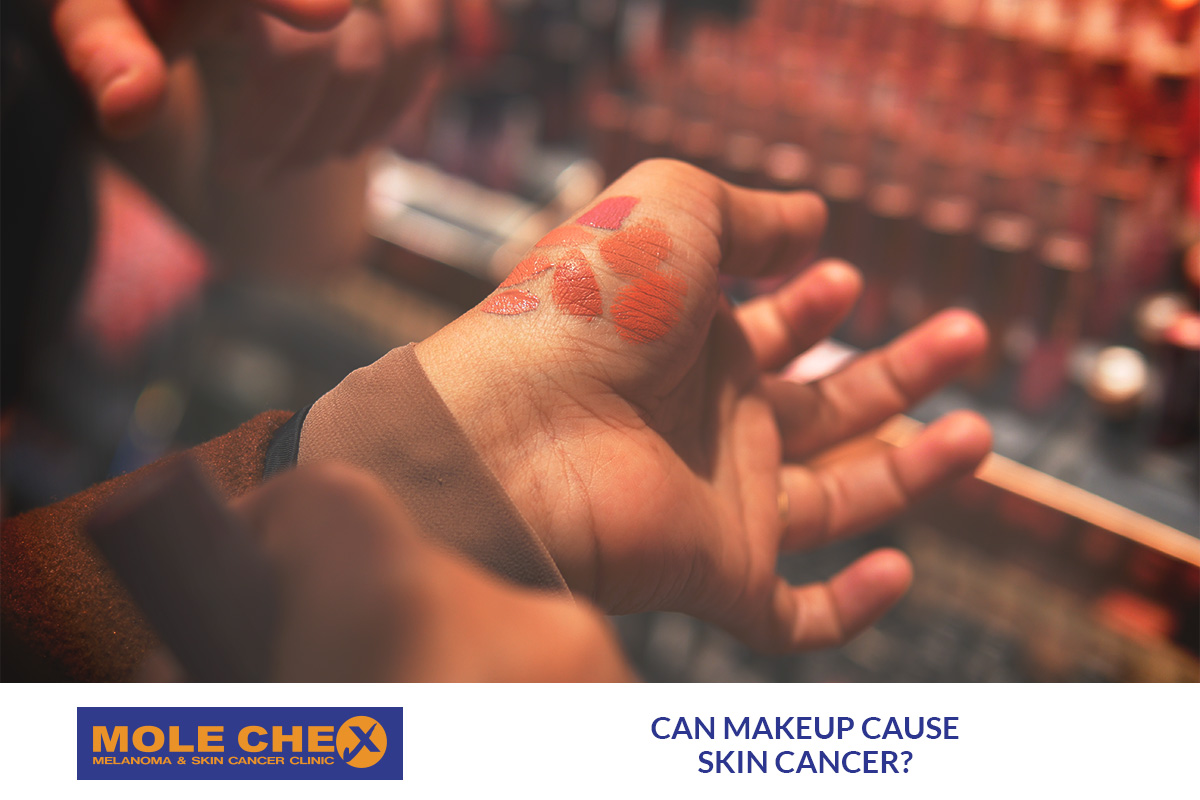Can Makeup Cause Skin Cancer?

Makeup is a daily essential for many Australians. Whether it is for personal confidence, professional presentation, or self-expression, cosmetics play a big role in everyday life. However, with Australia having one of the highest rates of skin cancer in the world, many people are asking a critical question: Can makeup cause skin cancer?
This article takes a closer look at the link between makeup and skin cancer, the safety of common cosmetic ingredients and what steps you can take to maintain healthy skin while enjoying your makeup routine.
What You’ll Learn
- How certain cosmetic ingredients may increase skin cancer risks
- The role of sun exposure and its interaction with makeup
- Practical tips for safe makeup use
- How to protect your skin long-term with daily skincare habits
- The importance of regular skin checks
Is There a Connection Between Makeup and Skin Cancer?
While there is no definitive evidence proving that makeup directly causes skin cancer, some cosmetic ingredients have raised health concerns. Many of these substances are legally permitted in cosmetic formulations, but their safety is still debated when it comes to long-term or frequent use.
Your skin absorbs what you apply to it and with makeup often used daily for years, cumulative exposure matters. Some ingredients may disrupt hormonal activity, irritate sensitive skin, or degrade under UV exposure, increasing the risk of skin problems over time.
Understanding which ingredients carry higher risks is essential for making informed, skin-conscious decisions.
Cosmetic Ingredients That Deserve a Closer Look
Some makeup products contain ingredients that may be linked to long-term health risks, especially when used without sun protection. Here are a few that warrant attention:
Talc – A common base in powders and eye shadows. Talc itself is not dangerous, but if not properly processed, it can be contaminated with harmful substances. Choose products that are certified asbestos-free.
Formaldehyde and Releasers – Used to preserve products and extend shelf life, these can release trace amounts of formaldehyde, a recognised irritant. Prolonged skin exposure may contribute to cellular stress.
Parabens – Synthetic preservatives that can mimic natural hormones. While used in small quantities, growing demand for paraben-free cosmetics reflects public concern about potential hormonal effects.
Phthalates – Often used to stabilise fragrance and increase product flexibility. These chemicals may disrupt hormone regulation, making them a growing concern in personal care formulations.
Benzene – Detected in some aerosol cosmetics, this compound is a known carcinogen and should be avoided entirely. Consumers are advised to stay informed about product recalls and ingredient alerts.
How Sun Exposure Impacts Makeup Safety
One of the biggest oversights in cosmetic use is underestimating the impact of UV exposure. Many assume makeup with SPF provides adequate protection. However, most cosmetics do not deliver full-spectrum or lasting UV defence especially under intense sun conditions.
Wearing makeup alone without applying proper sunscreen may leave the skin vulnerable to sunburn, pigmentation and DNA damage. In some cases, certain cosmetic ingredients can break down in the sun, making the skin more sensitive or increasing irritation.
For complete skin protection, always apply a separate broad-spectrum SPF 30+ sunscreen underneath your makeup and reapply throughout the day if outdoors.
Safe Makeup Practices for Everyday Use
Protecting your skin does not mean giving up makeup. Instead, focus on smart habits and informed product choices. Here’s how to reduce risk while maintaining your beauty routine:
Read ingredient labels carefully – Learn to recognise commonly flagged ingredients and opt for safer alternatives where possible.
Use sunscreen under makeup daily – This is the most effective way to reduce UV-related damage, even during overcast or cooler days.
Choose trusted brands– Support cosmetic companies that comply with TGA safety standards and provide full transparency.
Limit expired or open products – Old makeup can become contaminated and lose effectiveness. Replace creams, powders and mascaras regularly.
Avoid heavy layering of chemical-rich products – Simplifying your makeup routine helps reduce chemical build-up on the skin.
Ventilate while using sprays or aerosols – Ensure good airflow during application to avoid inhalation and product residue build-up.
Patch test new products – Before applying a new item to your face, test it on your inner arm or wrist to check for sensitivity.
Keep Your Skin in Check with Professional Guidance
If you use cosmetics regularly and want to prioritise your skin health, scheduling routine skin checks is a proactive step. Skin checks help detect early signs of skin cancer, monitor changes in moles or pigmentation and provide a tailored plan for your unique skin needs.
Conclusion
Makeup can be part of a healthy, confident lifestyle but awareness is key. While most cosmetic products are safe when used as directed, understanding how ingredients interact with your skin, especially under sun exposure, can help you make safer choices.
By applying sunscreen daily, using clean cosmetic products and booking regular skin assessments, you can enjoy your beauty routine while protecting your skin long-term. At Molechex, our clinics specialise in comprehensive skin checks, skin cancer treatments and cosmetic skin services. Our experienced GPs are trained in both clinical dermatology and cosmetic skincare, providing you with personalised support for your health and appearance. Whether you are seeking guidance on product use or concerned about skin changes, we are here to help you make informed, confident choices about your skin.
Read other article :
